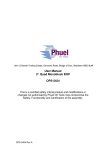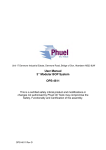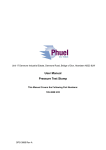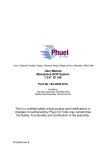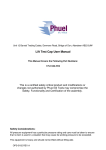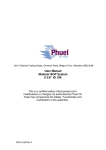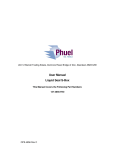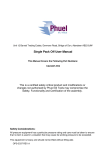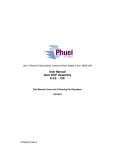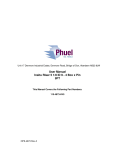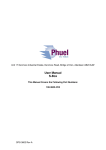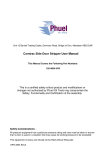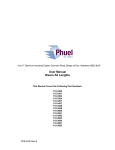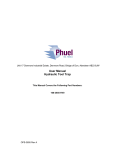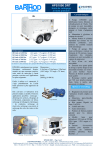Download User Manual 3`` Dual Monoblock BOP OPS-5481
Transcript
Unit 12 Barratt Trading Estate, Denmore Road, Bridge of Don, Aberdeen AB23 8JW User Manual 3’’ Dual Monoblock BOP OPS-5481 This is a certified safety critical product and modifications or changes not authorised by Phuel Oil Tools may compromise the Safety, Functionality and Certification of the assembly. OPS-5481 Rev A User Manual 3’’ Dual Monoblock BOP Table of Contents Table of Contents.............................................................................................. i Table of Tables ................................................................................................ ii Table of Figures ............................................................................................... ii Revision History .......................................................................................... iii Safety.............................................................................................................. iv 1 Introduction ............................................................................................... 5 1.1 General .............................................................................................. 5 1.2 Product Identification ......................................................................... 6 2 Technical Description ............................................................................... 7 2.1 Basic Description ............................................................................... 7 2.2 Balanced Piston ................................................................................. 7 3 Basic Operation ........................................................................................ 8 3.1 Operating the Rams........................................................................... 8 3.2 Equalising across the rams................................................................ 9 3.3 Job Planning .................................................................................... 10 4 Operational Characteristics..................................................................... 12 4.1 Sealing Characteristics .................................................................... 12 4.2 Fatigue Testing ................................................................................ 12 4.3 Ram Access Testing ........................................................................ 13 4.4 Shearing Performance and limitations ............................................. 13 4.5 Performance of Ram Guides ........................................................... 13 4.6 Temperature and Pressure Limitations ............................................ 14 5 Maintenance ........................................................................................... 16 5.1 Introduction ...................................................................................... 16 5.2 Schedule.......................................................................................... 16 5.3 Safety .............................................................................................. 17 5.4 Ram Seal Redress........................................................................... 17 5.5 Maintenance Record Sheet ............................................................. 23 6 Testing .................................................................................................... 24 6.1 Hydraulic BOP ................................................................................. 24 7 Drawings and Bills of Material................................................................. 26 8 Spares .................................................................................................... 34 OPS-5481 Rev A i User Manual 3’’ Dual Monoblock BOP Table of Tables Table 1: Technical Data ................................................................................... 6 Table 2: Shearing performance and limitations .............................................. 13 Table 3: Maintenance Record ........................................................................ 23 Table 4: 3” Dual Monoblock BOP 192-5481-HV0 .......................................... 26 Table 4: Modular Hydraulic Actuator Assembly 190-4289-HV0 ..................... 28 Table 5: Wireline Ram Assy 190-4360-HH0 .................................................. 30 Table 6: Shear Ram Assy 190-4359-HH0 ...................................................... 30 Table 7: 192-5511-HV0 Injection Module....................................................... 31 Table 9: Modular BOP Hydraulic Fittings 190-4433-HS1 ............................... 33 Table 10: Hydraulic Actuator Redress Kit RDK-4289-HV0 ............................ 34 Table 11: Injection Module Redress Kit RDK-5511-HV0................................ 34 Table 11: Wireline Ram Redress Kit RDK-4360-HH0 .................................... 34 Table of Figures Figure 1: 3’’ Dual Monoblock BOP .................................................................. iv Figure 2: Typical identification tag.................................................................... 6 Figure 3: Section through BOP rams ............................................................... 7 Figure 4: Equalisation Valve Layout................................................................. 9 Figure 5: Correct lubrication for storage ......................................................... 11 Figure 6: Qualified Operating Envelope ......................................................... 15 Figure 7: Accessing the rams......................................................................... 17 Figure 8: BOP Wireline Rams ........................................................................ 18 Figure 9: BOP Shear Rams ........................................................................... 18 Figure 10: Hydraulic Actuator Assembly (Part 1) ........................................... 20 Figure 11: Hydraulic Actuator Assembly (Part 2) ........................................... 21 Figure 12: Instructions for greasing of the Piston Shaft ................................. 22 Figure 13: 3” Dual Monoblock BOP 192-5481-HV0 ....................................... 27 Figure 13: 3’’ Modular Actuator Hydraulic 190-4289-HV0 .............................. 29 Figure 14: Wireline Ram Assy 190-4360-HH0 ............................................... 30 Figure 15: Shear Rams 190-4359-HH0 ......................................................... 30 Figure 16: Injection Module 192-5511-HV0 ................................................... 32 OPS-5481 Rev A ii User Manual 3’’ Dual Monoblock BOP Revision History Issue, Release Date Description Rev A, 04 Sep 13 Initial Issue OPS-5481 Rev A iii User Manual 3’’ Dual Monoblock BOP Safety WARNING: Trapped air requires considerable time to compress and when it is compressed is highly dangerous. It has enough stored energy to separate parts with considerable force. This product contains high pressures, when in operation. Failure of any part may cause injury. Welding, corrosion, rough handling, or other abuse may affect the Integrity of this product. All pressure equipment has a particular pressure rating and care must be taken to ensure that no item is used in a situation that may cause its working pressure to be exceeded. All personnel involved in pressure testing must be formally trained, competent and utilise the appropriate PPE. Ensure the identification plate is fitted and is displaying the correct information This equipment and the equipment it is attached to is heavy never position yourself below a suspended load Figure 1: 3’’ Dual Monoblock BOP OPS-5481 Rev A iv User Manual 3’’ Dual Monoblock BOP 1 Introduction 1.1 General The Blow Out Preventer (BOP) provides essential safety barriers against well pressure during wireline operations. It is usually located directly above the Xmas tree flange. The BOP has two sets of wireline rams for sealing against well pressure on slick line and/or braided line, This BOP is compatible with the Phuel 3” Modular BOP system with interchangeable rams and actuators. A sets of shear and seal rams can be fitted to this BOP, which are capable of cutting through the wire and then sealing against the well pressure. The ram is attached to a hydraulic piston that can be extended or retracted to energise or retract the ram. The ram has a set of inner and horse shoe outer seals that when compressed against the opposite ram forms a continuous seal that is further energised by the application of pressure in one direction. The ram consequently can be arranged so that it holds pressure from below the BOP or from above. Across the rams there is an equalisation valve assembly. This is used to equalise pressure across the rams so that the rams can be withdrawn to open up the well bore. The equalisation valve assembly consists of a cone seal set on a screw. Unwinding the screw opens the valve and allows equalisation across the rams. Tightening the screw closes the seal and prevents pressure from passing through the valve assembly. There is also a circuit to allow the injection of chemicals into the well or across the equalisation valves, and can be used to prevent the valves freezing while bleeding down gas (by injecting glycol for example). The injection port has a check valve to prevent well pressure entering the injection system. The BOP is mounted to a crash frame assembly that provides lifting points and protection during transport. This user manual serves as an introduction to the equipment and contains the relevant specifications, operation, planning and maintenance instructions, parts list and drawings. OPS-5481 Rev A 5 User Manual 3’’ Dual Monoblock BOP 1.2 Product Identification Phuel products are identified by a unique serial number that facilitates full product traceability. Each product is supplied with a documentation pack that contains product certification and material/inspection reports. The serial number is always etched on the surface of the product but can sometimes be difficult to find or read after painting. A customer identification number is also included to allow the customer to track the asset in their system. The nameplate tag that is stamped with the information shown below is secured either by a stainless steel band or fixed directly onto the assembly. This tag should be located in the first instance to ensure that this manual and any other paperwork refers to the correct equipment. Figure 2: Typical identification tag 1.3 Technical Specification Working Pressure Test Pressure Service Hydraulic Pressure Stroke Volume Weight Crashframe SWL 10,000 Psi 15,000 Psi H2S 2900 psi max (200 bar) 25 cu-in (0.41 Litre) Total Cycle 15.6 cu-in (0.26 Litre) to Close 9.4 cu-in (0.15 Litre) to Open 1057 lbs/ 479 kg 2 Tonne (2,000 Kg) Table 1: Technical Data OPS-5481 Rev A 6 User Manual 3’’ Dual Monoblock BOP 2 Technical Description 2.1 Basic Description The Phuel BOP provides a positive barrier against well pressure while performing intervention operations. The equipment consists of one or more sets of rams, operated either manually or hydraulically, that can be individually closed to form a seal against pressure. The orientation of the ram outer seal determines whether the rams hold pressure from above or below. By opposing adjacent ram sets it is possible to apply pressure between the rams through a grease injection port, normally at a pressure greater than the well pressure, and thus form a positive protection barrier. This technique is particularly effective when sealing against braided wire-line as a leak tight seal cannot be obtained due to the construction of the wire. The high viscosity of the grease allows the pressure to be maintained even though a small leak (of grease) still exists. Figure 3: Section through BOP rams (closed position) 2.2 Balanced Piston The actuator is designed with a balanced hydraulic piston that eliminates the end load that can be created due to well pressure. This means that the torque or closing pressure of the actuator is independent of the well pressure inside the BOP. This feature has two major advantages: The hydraulic volume requirements of the actuator are much less than a conventional BOP, this reduces the requirements for accumulator storage and charging. The BOP can be closed with the same amount of effort no matter what the well bore pressure exists in the bore. This is particularly useful with a manual actuator and ensures quick and safe closure. OPS-5481 Rev A 7 User Manual 3’’ Dual Monoblock BOP 3 Basic Operation 3.1 Operating the Rams Note – Always ensure that the pressure across the rams has been equalised before opening. 3.1.1 Hydraulic Operation The BOP has two pairs of connections for each ram set for open and close. It is important that both connections are connected, as the fluid displaced by the movement of the piston must be allowed to pass through the valve system back to the reservoir. A Well Control Unit (WCU) is normally used to operate the BOP in an offshore environment. Refer to the relevant manual for that equipment for details of operation and connection. An alternative pump pack may be used for onshore maintenance work but the operation of this equipment is out with the scope of this manual. 3.1.2 Locking the Hydraulic Rams After closing with hydraulic pressure the piston can be mechanically locked by winding in the manual mechanism. Turning the drive shaft in a clockwise direction will advance the locking mechanism by 3mm per turn. It is therefore necessary to turn the hand wheel 20-25 turns to lock in the piston. Continue to turn until the hand wheel stops, indicating that the piston is now against the back-up lock. For safety reasons and to reduce the mechanical effort required, Phuel recommends that the hydraulic pressure be removed or reduced while closing the mechanical back up. This reduces the risk of injury caused by the failure of a seal under hydraulic pressure and decreases the time required to implement the back-up feature. It is important to remember that the manual lock must be fully withdrawn before the rams can be opened. 3.1.3 Proper Use In the event that the BOP is closed against wire during an operation, it is essential that the Inner seals are replaced after that job has been completed. Working practice and procedures must reflect this requirement. Blind shear seals should always be fitted on the shear rams. They should be tested regularly to verify that they are suitable for operation. If they are ever OPS-5481 Rev A 8 User Manual 3’’ Dual Monoblock BOP closed during a live well operation they should be replaced when the operation is complete. 3.1.4 Bleed Down Rate in Gas Wells To avoid explosive decompression in gas wells (or oil wells were there is a large quantity of gas present) it is important to control the bleed down rate of the pressure. The following procedure is recommended: 1. Reduce pressure from 10000 to 2000 Psi at a rate of 1000 psi per minute 2. Reduce pressure from 2000 psi to 1000 psi at a rate of 100 psi every one minute. 3. Reduce pressure from 1000 Psi to zero at a rate of 20 psi per minute. 3.2 Equalising across the rams There is an external port that allow the connection of a pressure gauge or dump valve if required. There is also an injection port that feature a check valve. There is an isolation valve for each opening into the BOP Body which allow flow to either side of the rams. It is therefore possible to equalise across any ram or combination of rams. VALVE 1 VALVE 2 INJECT GAUGE VALVE 3 Figure 4: Equalisation Valve Layout (note ram orientation may differ) OPS-5481 Rev A 9 User Manual 3’’ Dual Monoblock BOP 3.3 Job Planning 3.3.1 Before the Job Note – Configuration will determine which processes are required • • • • Check that the certification is within date and that the scheduled maintenance is up to date. All blind (shear) inner seals need to be inspected after 30 pressure cycles, and replaced where necessary. Wire-line seals must be tested without the use of test rods and must always be replaced after being closed on wire during normal operations. Always inspect the wireline seals for signs of wear or damage and replace if necessary. Examine the BOP Assembly, to make sure that it is good operating order and assembled with the Rams in the correct orientation for the desired operation. Functioning of the Rams may be checked, by running both Rams to the closed position. 3.3.2 During the Job • • • • • Special care should be taken that the Rams are fully open when passing any equipment through them. The impact of the tool string hitting a Ram may damage the Ram to such an extent that the Ram may no longer Seal, or prevents it from fully opening. Only lift the BOP using suitable lift caps. Do not sling or attach lifting equipment to the crash frame or bars to lift the BOP assembly. Care should be taken to completely remove any residual pressure or accumulated pressure existing on Lubricator equipment above the BOP, before disconnecting the Lubricator. Hydraulic Hose ends should never be allowed to drop in to dirt or grit, or otherwise become contaminated with foreign matter. If end connections become dirty, they should be cleaned thoroughly with solvent and dried. Only clean Hydraulic fluid should be used (Shell Tellus 22 is recommended) to operate the BOP. The use of mixed types, dirty, or very old fluid of unknown origin is not recommended. When one of these conditions is known or suspected, the hydraulic system should be flushed and the hydraulic fluid replaced. 3.3.3 After the Job After each job, the BOP should be thoroughly cleaned, repaired as required and redressed. The BOP should be protected against the effects of corrosion to ensure that the expected functionality is achieved. The diagram overleaf highlights the key areas to consider. OPS-5481 Rev B 10 User Manual 3’’ Dual Monoblock BOP Grease seal bore and threads before fitting thread protectors Cover the assembly when in long term storage With the actuators closed pump grease to all grease ports until it flows through the other port Smear grease on all bars Touch up paint when it is damaged or coat damaged area with thick grease Figure 5: Correct lubrication for storage OPS-5481 Rev A Grease before fitting protectors. For long term storage fit test stump and fill with oil 11 User Manual Modular BOP System 4 Operational Characteristics 4.1 Sealing Characteristics 4.1.1 Minimum Hydraulic Pressure The actuator is pressure balanced and so it is possible to close the rams against any well pressure with more than 500 psi. In order to ensure that the BOP seals correctly it is recommended to apply the full closing pressure of 2900 psi (200 bar). In most cases the BOP will seal with pressures greater than 1,000 psi (70 bar) applied. 4.1.2 Opening the BOP with differential pressure It is not recommended that the BOP should be opened with differential pressure across the rams. The pressure should always be equalised first, using the equalising valves. Even with differential pressure applied across the rams it is possible for the BOP to be opened if the opening pressure is greater than 1400 psi. The manual locking feature should therefore be used when the BOP is closed to prevent accidental opening 4.2 Fatigue Testing Testing has been performed to establish the fatigue limit of the actuators and shear rams so that preventative maintenance can be scheduled to replace worn seals or parts. A total of 546 close/open cycles have been completed without failure including 78 pressure cycles to maximum working pressure. This test simulates closing and opening the BOP once per day and testing well bore pressure at 300 psi and 10,000 psi once per week for 1.5 years of service. Records must be maintained to ensure that the seals are replaced before this limit is exceeded. If records do not exist then the seals should be changed every year as a minimum. Fatigue life has not been defined on the wireline seals due to their less critical function and the fact that these are to be replaced whenever they are closed on the wire. Pre-job inspection to verify their condition is therefore required and replacement if they are not in good physical condition. OPS-5481 Rev A 12 User Manual Modular BOP System 4.3 Ram Access Testing Testing has been performed to determine the ability of the BOP to undergo repeated ram changes without affecting operating characteristics. The tests have shown that the rams were accessed a total of 200 times (test limit) without failure of the sealing or locking mechanism. Records must be maintained to ensure that the seals are replaced before this limit is exceeded. If records do not exist then the seals should be changed every year as a minimum. 4.4 Shearing Performance and limitations Testing has been conducted to verify the shearing and sealing capabilities of the shear rams. The minimum tool string weight must be achieved either by direct weight or the combination of that and additional tension to ensure that the cutting performance is achieved. Wire Size (dia) No of wires Wire Type 0.125” 1 Slick line 0.125” 6 0.160” Minimum Tool String Weight 250 Kg Hydraulic Pressure needed to shear at zero bore pressure 1060 psi Maximum Wellbore Pressure (psi) 10,000 psi Slick line 250 Kg 2120 psi 10,000 psi 1 Slick line 250 Kg 1670 psi 10,000 psi 7/32” 1 Braided 250 Kg 1060 psi 10,000 psi 7/32” 2 Braided 250 Kg 1700 psi 10,000 psi 9/32” 1 Braided 250 Kg 1670 psi 10,000 psi 5/16” 1 Braided 250 Kg 1700 psi 10,000 psi 7/16” 1 Braided 250 Kg 2970 psi 10,000 psi 15/32” 1 Braided 250 Kg 2970 psi 10,000 psi Table 2: Shearing performance and limitations Note – The shear rams are designed to cut only once. The rams must be replaced once they are used to cut wire. 4.5 Performance of Ram Guides Testing has been conducted to verify that the wireline rams can centralise the cable without cutting – at extreme wire positions and with applied side loadings. The rams always closed without incident or damage to the cable. Operational planning and set up should still attempt to minimise the expected side loading on the wire by ensuring the lubricators are vertical and that the tool string is centralized as much as possible in the well bore. OPS-5481 Rev A 13 User Manual Modular BOP System 4.6 Temperature and Pressure Limitations Testing has been conducted to verify the performance of the BOP at extreme operating temperatures. 4.6.1 General Sealing The BOP seals (typically O-Rings and T-Seals of 90 hard Viton material with part numbers listed in this manual) have been qualified for operating temperatures between -10C and 121C with no restrictions to the operating pressure. 4.6.2 Blind Ram Shear Seals The shear rams (using blind ram inner shear seals part number 190-4141-H80 & 190-4142-H80) have been qualified for operation between -10C and 121C with no restrictions to the working pressure. 4.6.3 Wireline Multi-Seals The wireline multi-seal (part number 190-4170-H80 & 190-4171-H80) are qualified to be used within the operating envelope shown below. If operations dictate that the expected surface temperatures and pressures exceed the operating envelope then wire specific inner seals must be used instead of the standard multi-seal. Consult Phuel Oil Tools for advice and part numbers. OPS-5481 Rev A 14 User Manual 3’’ Dual Monoblock BOP Figure 6: Qualified Operating Envelope OPS-5481 Rev A 15 User Manual 3’’ Dual Monoblock BOP 5 Maintenance All maintenance to be carried out by suitably qualified and competent personnel 5.1 Introduction Regular maintenance of the equipment using Phuel redress kits or approved spares is essential to its continued safe operation. Ensure that the pre and post job operating procedures are followed and that maintenance records are kept. 5.2 Schedule The maintenance schedule may be governed by international or company standards and the following is considered to be the minimum requirements. 5.2.1 Pre & Post Job Refer to Section 3.3.1 and Section 3.3.3 for details. 5.2.2 Yearly • Visually inspect the BOP for signs of wear or damage • Close the rams with 3,000 psi and hold for 10 minutes with no leaks allowed. Open the rams with 3,000 psi and hold for 10 minutes with no leaks allowed. If there are leaks then the actuators will need to be disassembled and the seals replaced. • Disconnect the actuators and inspect the rams (guides and seals). Replace the seals if they are worn or damaged. Re-assemble • Re-apply grease to the balanced piston, ref Figure 13: Instructions for greasing of the Piston Shaft • Verify that the equalising valves are moving freely and smoothly • Verify that the tie bolt nuts and all other screws are tight • Remove external rust or treat using a non-toxic rust remover gel or liquid. • Inspect the condition of quick union sealing surfaces and surface coatings, repair/replace as necessary. • If any of the above are showing signs of wear or damage then strip down to investigate and replace parts or seals as necessary. • Re-assemble and then pressure test according to Section 7 • Inspect paintwork and repair where necessary. 5.2.3 Five Yearly • Recertification by Phuel Oil Tools in accordance with DNV-RP-E101 OPS-5481 Rev A 16 User Manual 3’’ Dual Monoblock BOP 6 Safety • • • • This product contains high pressures, when in operation. Failure of any part may cause injury. Welding, corrosion, rough handling, or other abuse may affect the Integrity of this product. Wear appropriate personal protective equipment. Do not over exert yourself while using torque wrenches. Use appropriate mechanical advantages when available. Ensure that all tools and equipment are in good condition and are suitable for intended use. 6.1 Ram Seal Redress Note: If rams are required to be removed ensure they can be moved fully forward when the time comes. 6.1.1 Access Rams This procedure results in the disconnection of the actuator assembly from the BOP body in order to gain access to the rams. • Ensure Rams are fully opened. • Back off the Actuator from the BOP using the extended 5/16” Allen Key in the Cap Screw heads on the Locking Sleeve. Do not loosen the cap screws during this process. • Once the thread is fully disengaged, pull the Actuator fully back to the End Stops. Figure 7: Accessing the rams (Note figure shows single modular BOP Body) 6.1.2 Ram Removal (not required to redress ram seals) • Pump the actuator forward until the back of the ram is clear of the Collar • Undo guide bar, ensuring the nordlok washer remains in the actuator piston housing, and slide into ram • Remove Ram from Actuator, by sliding the Ram off the Piston. OPS-5481 Rev A 17 User Manual 3’’ Dual Monoblock BOP 6.1.3 Ram Seal Redress • The Inner Ram Seals can be removed by simply sliding the seal out to either side • The Outer Seal can be removed by levering out one end with a suitable instrument and simply pulling off. • The Ram is now completely stripped down. Clean and inspect all parts for evidence of damage or excessive wear. Check the seals and replace if required. Repair or replace any damaged or worn parts. If the seals are to be redressed use the parts from the specified redress kit. • Assemble Outer Seals by pushing the tab into the slot in the ram and working it around the radius of the ram. Tap home using a rubber or hide mallet and if required use a screwdriver to lever the second tab over the edge of the slot. Take care not to damage the Seal during assembly but expect that some slithers of rubber will be produced as the corners of the rubber seals are removed by the assembly operation. Tap all around the circumference of the seal to ensure that it is bedded into the groove and that the seal is not protruding above the ram diameter. • Slide the Inner Seals into Ram taking care not to dislodge the outer seal in the process. Ensure the Guided Inner Seal is fitted to the correct ram as shown below. Figure 8: BOP Wireline Rams Figure 9: BOP Shear Rams OPS-5481 Rev A 18 User Manual 3’’ Dual Monoblock BOP 6.1.4 Re-attach to BOP Body • If the rams were removed from the actuator (Section 6.1.2) then slide the ram back onto the actuator and guide bar out of the ram and attach the bar back to the piston housing taking careful note of the orientation of the rams depending on its intended use for the BOP assembly. (i.e. if pressure is to be held from below then the outer seal must be on top – otherwise it must be on the bottom). Attach a hydraulic pump, if required, to the open port of the actuator and pump the rams back into the recess in the actuator ensuring that the ram does not hang up on the actuator front face. When fully back remove the hydraulic pump. Note - It is still possible to assemble the actuator to the BOP without pumping back the rams but more effort may be required to allow the thread to make up. • • • Apply a generous coating of grease to the inner and outer seals. Push the Actuator back into BOP Body taking care that the edges of the guide pass into the seal bore and make-up the thread using a 5/16” hex key in the cap head screws to provide the torque. Making up the thread will drive the actuator assembly fully home. The Ram Assembly is now fully made up. Repeat this procedure for each ram seal that need to be replaced. 6.2 Special Tools General workshop tools will be required to maintain, and assemble and disassemble the BOP. To undo and tighten the balanced piston from the hydraulic piston, two hex keys are required, 3/8” and 1-1/8”. Phuel can supply a Hex bar to fit this piston and allow a 1-1/8” socket to be connected. Figure 10: 950-4656-316 - Piston Assembly Tool OPS-5481 Rev A 19 User Manual 3’’ Dual Monoblock BOP Figure 11: Hydraulic Actuator Assembly (Part 1) OPS-5481 Rev A 20 User Manual 3’’ Dual Monoblock BOP As an alternative to hex key, an Assembly Tool (Part number: 950-4656-316) is available to allow use of 1-1/8” socket. Figure 12: Hydraulic Actuator Assembly (Part 2) OPS-5481 Rev A 21 User Manual 3’’ Dual Monoblock BOP Figure 13: Instructions for greasing of the Piston Shaft OPS-5481 Rev A 22 User Manual 3’’ Dual Monoblock BOP 6.3 Maintenance Record Sheet Type of Performed Date Performed Maintenance By Verified By Comments Table 3:Maintenance Record OPS-5481 Rev A 23 User Manual 3’’ Dual Monoblock BOP 7 Testing All testing is to be carried out in the designated test area and by suitably qualified and competent personnel. Safety procedures must be followed. WARNING: Trapped air requires considerable time to compress and when it is compressed is highly dangerous. It has enough stored energy to separate parts with considerable force. 7.1 Hydraulic BOP Check the build configuration then test accordingly using the procedures laid out below 7.1.1 Prepare BOP for pressure testing • • • • • • • • • • • • Check the pressure rating for all test equipment is sufficient to allow testing to be carried out. Check / replace o-ring on the pin part of the BOP. Ensure BOP is placed in an area suitable for pressure testing. Fit the BOP to the test stump. Fit the test hose to the Gauge port on the Equalising Block or if using the Injection Port then first remove the check valve. Makeup BOP (collar) on test stump by turning the "collar" all the way down, and then back off ¼ turn Fill BOP with test fluid. Connect the hydraulic hoses from the BCU to BOP to operate the rams. Check all connections / hoses that they are secured with safety wire before use Vent BOP Rams by opening and closing the Rams a few times each. On completion of venting the Rams fit test cap, ensuring the test cap valve is in the open position to allow air to vent and top up the BOP with Test Fluid. Once all air is expelled close test cap valve. The BOP is now prepared for testing OPS-5481 Rev A 24 User Manual 3’’ Dual Monoblock BOP 7.1.2 Body Test • • • • • • Ensure that all the rams are in the open position Open all the equalising valves. Pump slowly up to 300 psi and observe for leaks. Hold Time 5 min Bleed the pressure to zero Pressurize to MWP of BOP and observe for leaks. Hold Time 15 min Bleed of pressure to zero and drain BOP. 7.1.3 Ram test • • • • • • • • • Close the Ram, this is done by activating the BCU ram seal valve to "close" position, then pressurize up to a maximum of 3,000 psi on the ram – Test fluid may be observed coming out of the Test Cap valve. Close all equalising valves except the bottom valve (5) so that pressure testing is done from the underside of rams and up Put up safety barrier in the work area. Observe Test Cap valve during testing for fluid leaking out under pressure. Pressurize up to 300 psi low pressure test - observe if there are leaks. Hold Time 10 min Bleed the pressure to zero Press up to the MWP for the bop in accordance documentation – maintain the pressure for 10 min without leakage. Bleed the pressure to zero. Open rams on bop by enabling BCU ram seal valve to "open" position. 7.1.4 Post Test Procedure • • • • • • Disconnect All Hoses Remove Test Cap Drain out test fluid and circulate with water displacing fluid or lubricating oil Re-fit the gauge to the Equalising Block if required or re-fit the check valve if removed earlier. Remove BOP from Test Stump Grease end connections and fit oiled thread protectors OPS-5481 Rev A 25 User Manual 3’’ Dual Monoblock BOP 8 Drawings and Bills of Material Item 1 2 3 4 5 6 7 8 9 10 12 13 14 15 16 Part Number 192-5501-480 190-4289-HV0 190-4360-HH0 125-4945-HS0 192-5511-HV0 190-4433-HS1 190-4276-X90 190-1672-316 CSU-0585-3A4 900-3253-STL 125-3212-AL7 HNC-0750-A2H 192-5504-STL SHC-0625-HTS WNL-0620-316 Quantity 1 4 2 1 1 2 8 8 8 1 8 8 1 12 12 Description DUAL BOP BODY 3" BX FLANGED 3" MOD PISTON ACTUATOR MODULAR 3" GUIDE RAM ASSEMBLY 3 ID X-OVER 4-3/4-4 BOX X 3-1/16 BX FLG 10K 3" MONO DUAL INJECTION MODULE 3" Mod Hydraulic Kit (Snap Tite) 3" MOD SLIDER ROD (25MM) END STOP CSink Soc Hd Size 1/2 UNC Length 1 in SEAL RING BX 154 STUD 1.00-8 UN X 5.50 LONG Hex Nut 1.00 - UNC 3" DUAL MONOBLOCK BOP CRASHFRAME Soc Hd Cap Size 5/8 Length 1.5 Nordlock Washer 5/8 (NL16) Table 4: 3” Dual Monoblock BOP 192-5481-HV0 OPS-5481 Rev A 26 User Manual 3’’ Dual Monoblock BOP Figure 14: 3” Dual Monoblock BOP 192-5481-HV0 OPS-5481 Rev A 27 User Manual 3’’ Dual Monoblock BOP Item 1 2 3 4 5 6 7 8 9 10 11 12 13 14 15 16 17 18 19 20 21 22 23 24 25 26 27 28 29 30 32 33 34 35 36 37 Part Number Quantity 190-4277-480 1 190-4282-480 1 190-4281-480 1 190-4198-480 1 190-4278-480 1 190-4201-480 1 190-4279-480 1 190-4286-480 1 190-4287-480 1 190-4283-460 1 190-4284-316 1 190-4290-480 1 190-4202-ALU 1 190-4319-PEK 1 190-4335-316 8 801-0340-V90 1 190-3870-H85 1 190-4343-PEK 1 802-4340-H85 1 802-4339-H85 2 801-0231-V90 1 802-4341-H85 1 801-0235-V90 1 802-2505-H85 1 802-4342-H85 1 WNL-0540-316 8 SDU-0585-316 4 SDU-0505-HTS 3 SHC-0503-HTS 2 WNL-0500-316 2 WNL-3703-316 1 100-2209-316 2 190-1608-STL 2 190-4338-STL 1 190-1756-STL 4 190-2491-STL 1 Description 3" MOD PISTON HOUSING 3" MOD HYDRAULIC CYLINDER HOUSING 3" MOD CYLINDER CAP 3" MOD ACTUATOR COLLAR 3" MOD BALANCED PISTON 3" MOD SEAL RING 3" MOD HYDRAULIC PISTON 3" MOD DRIVE ROD 3" MOD DRIVE SLEEVE 3" MOD KEY PLATE 3" MOD INDICATOR ROD 3" RAM GUIDE BAR 3" MOD BEARING BRACKET 3" MOD KEY BUSH COLLAR BOLT 3" MOD O-Ring - B.S Size 340 ROD SEAL GREASE SCRAPPER RING PISTON T-SEAL 2.385 ROD T-SEAL 1.750 O-Ring - B.S Size 231 PISTON T-SEAL 2.750 O-Ring - B.S Size 235 ROD T-SEAL 0.825 DIA ROD T-SEAL 0.245 Nord Lock Washer Size 3/8 Set Screw Dog Point 1/2 UNC X 1.000 in Set Screw Dog Point Size 1/4 Length 0.75 in Soc Hd Cap Size 1/4 Length 0.5 in 1/4" Nordlock Washer NORDLOCK WASHER M4 NPT SOCKET HEAD PLUG 1/8 Ball Slide ( TK-25-UU) Thrust Bearing (FAG 811 06) EXTERNAL CIRCLIP (EXT-0400) EXTERNAL CIRCLIP (SH-75)- 0.750 DIA Table 5: Modular Hydraulic Actuator Assembly 190-4289-HV0 OPS-5481 Rev A 28 User Manual 3’’ Dual Monoblock BOP Figure 15: 3’’ Modular Actuator Hydraulic 190-4289-HV0 OPS-5481 Rev A 29 User Manual 3’’ Dual Monoblock BOP Item 1 2 3 4 5 Part Number Quantity 190-4363-480 1 190-4364-480 1 190-4171-H80 1 190-4170-H80 1 190-3107-H70 2 Description MODULAR NO GUIDE RAM - 3.00" MODULAR GUIDED RAM - 3.00" 3" GUIDING INNER MULTI-SEAL 3" POINTED INNER MULTI-SEAL BOP OUTER SEAL - 3.50 Table 6: Wireline Ram Assy 190-4360-HH0 Figure 16: Wireline Ram Assy 190-4360-HH0 Item Number 1 2 3 4 5 Part Number 190-4362-480 190-4361-480 190-4141-H80 190-4142-H80 190-3107-H70 Quantity Description 1 MODULAR 3" GUIDING SHEAR RAM BODY 1 1 1 2 MODULAR 3" SHEAR RAM BODY (NO FINS) 3" POINTED INNER BLINDSEAL 3" GUIDING INNER BLIND SEAL BOP OUTER SEAL - 3.50 Table 7: Shear Ram Assy 190-4359-HH0 (for information not fitted upon supply) Figure 17: Shear Rams 190-4359-HH0 (for information not fitted upon supply) OPS-5481 Rev A 30 User Manual 3’’ Dual Monoblock BOP Item 1 2 3 4 5 6 7 8 9 10 11 12 13 14 15 16 17 18 19 20 21 22 Part Number 190-4255-480 190-4285-480 190-4275-480 145-2176-480 900-3019-480 110-2979-316 190-2823-PEK 100-2114-PEK 190-2786-PEK 145-2185-STL 190-1749-STL 190-1703-STL 801-0119-V90 801-0108-V90 801-0110-V90 SHC-0583-3A4 SHC-0585-3A4 WNL-0580-316 SBC-0543-304 WNL-0540-316 SHC-0586-3A4 190-2821-316 Quantity Description 1 MOD EQUALISATION BLOCK (LW) 1 MOD EQUALISING END VALVE SAVERSUB 1 3" MOD CONNECTING BAR 2 SAVER SUB PORT 1 CHECK HOUSING 3 VALVE 3 VALVE SEAT 1 CHECK VALVE SEAL 1 CHECK CONE SEAL 1 COMP SPRING (D22120) 1 COMP SPRING (C5515650) 1 Hollow Lock Screw 3/4-16 (MAC-765) 6 O-Ring - B.S Size 119 3 O-Ring - B.S Size 108 3 O-Ring - B.S Size 110 8 Soc Hd Cap 1/2 UNC Length 3/4 in 2 Soc Hd Cap Size 1/2 Length 1 in 14 WASHER NORDLOCK (M12) 3 Button Hd Screw Size 3/8 Length 0.625 in 3 Nord Lock Washer Size 3/8 4 Soc Hd Cap Size 1/2" UNC Length 1.25 in 1 PORT BLANK END Table 8: 192-5511-HV0 Injection Module OPS-5481 Rev A 31 User Manual 3’’ Dual Monoblock BOP Figure 18: Injection Module 192-5511-HV0 OPS-5481 Rev A 32 User Manual 3’’ Dual Monoblock BOP Item 1 2 3 4 Part Number 950-2558-316 950-2559-316 950-2587-316 950-4434-316 Quantity 2 2 4 4 Description 1/4 SNAPTITE COUPLER (PT.NO. SVHC44FV) 1/4 SNAPTITE NIPPLE (PT.NO. SVHN44FV) MALE NIPPLE 1/4in NPT NPT SOCKET HEAD PLUG 1/4 Table 9: Modular BOP Hydraulic Fittings 190-4433-HS1 OPS-5481 Rev A 33 User Manual 3’’ Dual Monoblock BOP 9 Spares Use only spares supplied or approved by Phuel Oil Tools Ltd. It is recommended that sufficient quantities of the following spares be maintained to ensure that the equipment is always available when required. Elastomeric spares are supplied in Viton material as standard. Other materials are available please specify when ordering. Part Number Quantity Description 190-4319-PEK 801-0340-V90 190-3870-H85 190-4343-PEK 802-4340-H85 802-4339-H85 801-0231-V90 802-4341-H85 801-0235-V90 802-2505-H85 802-4342-H85 1 1 1 1 1 2 1 1 1 1 1 3" MOD KEY BUSH O-Ring - B.S Size 340 ROD SEAL GREASE SCRAPPER RING PISTON T-SEAL 2.385 ROD T-SEAL 1.750 O-Ring - B.S Size 231 PISTON T-SEAL 2.750 O-Ring - B.S Size 235 ROD T-SEAL 0.825 DIA ROD T-SEAL 0.245 Table 10: Hydraulic Actuator Redress Kit RDK-4289-HV0 Part Number Quantity Description 190-2823-PEK 801-0119-V90 801-0108-V90 801-0110-V90 3 6 3 3 VALVE SEAT O-Ring - B.S Size 119 O-Ring - B.S Size 108 O-Ring - B.S Size 110 Table 11: Injection Module Redress Kit RDK-5511-HV0 Part Number Quantity Description 190-4171-H80 190-4170-H80 190-3107-H70 1 1 2 3" GUIDING INNER MULTI-SEAL 3" POINTED INNER MULTI-SEAL BOP OUTER SEAL - 3.50 Table 12: Wireline Ram Redress Kit RDK-4360-HH0 Individual seals and parts may be ordered as required. See the parts list in the previous section for part numbers 9.1 Supporting Equipment 950-4656-316 - Piston Assembly Tool OPS-5481 Rev A 34



































